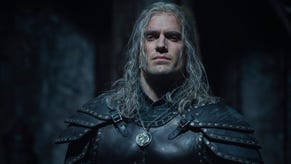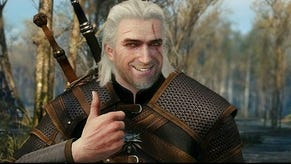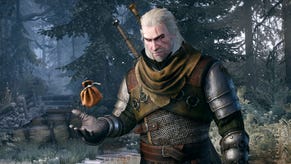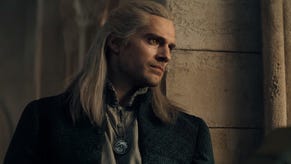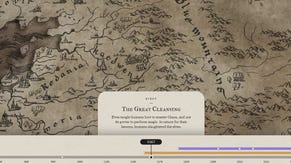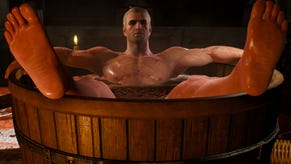The Games of Christmas '11: Day Four
I didn't say "bifurcation" even once
It is, apparently, the season to be jolly. So which is the season to be deadpan? And the season to be sardonic? It seems like who ever is deciding on which season is which attitude really hasn't thought through a fair system of use, or considered the roles they play in our society. I honestly think a poll for the use of seasons is the only fair way to decide.
Anyway, which game is day four? Which, indeed?
It's... The Witcher 2!
Jim: When it began to make itself available to me, The Witcher 2 was a tease. I had seen nothing of the game, avoiding most of the coverage in anticipation of having the kind of unspoiled, time-loss RPG indulgence I'd hoped it would be, until I had to play the preview code. That was the prologue and the first chapter - just up to the point where the plot splits, and where things can go very differently for you indeed. On my first playthrough of the preview code I didn't realise quite how differently it would go after the events of that chapter, and I was sceptical that this was anything other than another essentially linear RPG, carefully disguising its lack of choices with a few branches of dialogue.
The truth is, however, that The Witcher 2 was one of the bravest RPGs in years, at least in terms of the way it delivered its story. The choices you made in the first chapter not only have serious consequences for the people in the small town you were adventuring in and around, but they also decided how you'd experience the second, and main, chapter of the game. This felt incredible to play, particularly once you realise that you were going to be able to go back and see all those events from a totally different perspective, in a different environment. Of course you got to glimpse both areas of play from wherever you went through the game, but two paths were nevertheless distinct and inspiring. If only we got more RPGs of this sort of ambition, I thought to myself. If only they were all as deliberate in mapping out the results of your choices. If only.
From an even nerdier perspective, I was also glad that The Witcher 2 looked so good and demanded so much of PCs. 2011 has been the first year since around 2007 in which I've seen people seriously discussing their need to build new, dedicated gaming machines to make the most of the games that have been coming out, and The Witcher 2 was one of those that caused the biggest flapping open of wallets. Rightly so, because it was one of the most beautiful videogame creations we've ever seen. Not, sadly, as open as many games this year, but making up for it in lavish density of detail and a rich, diverse, gritty, believable world.
The Witcher 2 came close to being my game of the year, but sadly missed the target and sailed several places down the list. There are numerous reasons for this, but it's not all to do with the quality and content of other games. The Witcher 2's bizarre inverted difficulty curve, its doors, and its stuttering plot, all led to some dissatisfaction on my part. Having completed the game I felt that with just a few things done differently (including a better map and interface) there might have been no contest.

More recently, though, I've found myself pondering the ways in which The Witcher 2 seemed to managed to put off lots of gamers, despite being such a heavyweight RPG, of the kind we seem to keep on asking for. The opening trickiness (and the likelihood of being thrown into the confusing and deadly dragon-attacking scene almost as soon as the game starts) seems to have deterred many. Indeed, a few people I know - John for instance - gave up in annoyance and frustration after the first few moments. Others still were put off by the game's seediness - the male sex focus of it all, and the way in which it forces you to play as one character, the titular Witcher, presuming that we can have little real influence on the role that he plays.
Some of the people who sidestepped The Witcher 2 were expecting a repeat of their experience with The Witcher, and the opening parts of the game seemed to confirm it. Indeed, there's plenty here that does shadow the original, but I feel it's an improvement in so, so many ways. The most important of these is simply in the story it tells, the elegance with which it tells it, and the range of events which it contains. As a whole, however, even this felt like a stopgap.
The endgame was, as is so often the case in games now, not really an end at all, but more like a signpost to the next game in the series. This irritated me at the time, but actually I feel like it could be beneficial, if CD Projekt don't take too many years in getting to the next game. We could, when more of Geralt's saucy adventures are done, have one of the most spectacular and satisfying RPG tales ever told, with The Witcher 2 simply being one of the middle chapters. A segue, pointing to the real adventure to come.
That's a future I truly hope we get to see. CDP, you've come so far, please don't let us down.



